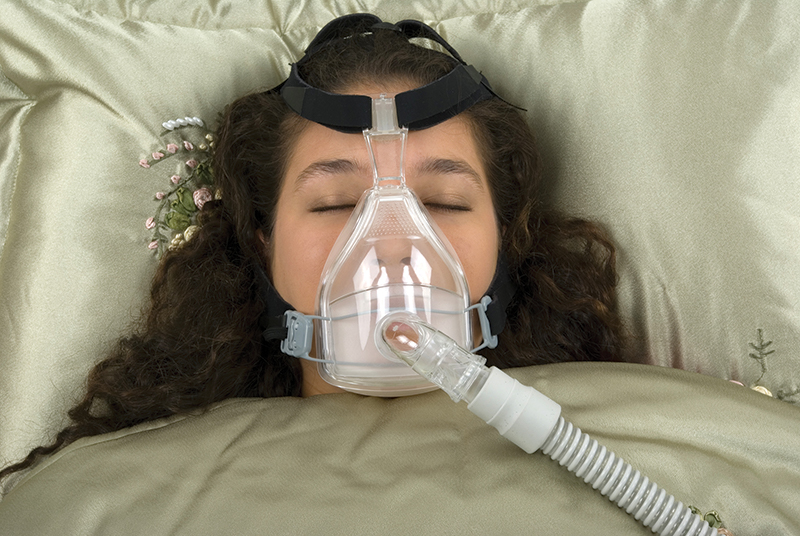A full night’s sleep is supposed to be restful and recharging, but for millions of Americans, that’s not the case. Many wake up in the morning tired and unrested, and most don’t know that sleep apnea is to blame. Sleep apnea is a condition that disrupts sleep, keeping sufferers from getting that restful, restorative sleep that is so important. Sleep apnea can also cause further health issues, both mental and physical, so it’s important to know the signs and symptoms. Take our quiz and arm yourself against the dangers of sleep apnea.
1.) Which of the following defines sleep apnea?
- When sleep terrors and other sleep conditions disrupt your sleep.
- When breathing is briefly and repeatedly interrupted—for at least 10 seconds—during sleep, fragmented sleep and low blood oxygen levels.
- When depression or other mental health issues disrupt sleeping patterns.
- When you are unable to control when you fall asleep or wake up.
2.) True or False? Over 18 million American adults suffer from sleep apnea.
3.) What factors increase the risk of developing sleep apnea?
- Having a small upper airway, a recessed chin, or a small jaw.
- Being overweight or having a large neck size: 17 inches or greater in a man, or 16 inches or greater in a woman.
- Having or a large overbite, a large tongue, tonsils or uvula.
- Smoking and alcohol use.
- Being age 40 or older, being male, or being certain ethnicities
- All of the above
4.) Fill-in-the-Blank: Chronic _________ is a strong indicator of sleep apnea.
- Snoring
- Coughing
- Acid reflux
- Migraine
5.) What issues can be caused by the sleep deprivation of sleep apnea?
- Difficulty concentrating, learning and memory difficulties.
- Depression, irritability, and sexual dysfunction.
- Disturbed sleep, excessive sleepiness during the day, and falling asleep while at work, on the phone, or driving.
- Health issues like high blood pressure, heart attack, congestive heart failure, liver issues, type 2 diabetes, cardiac arrhythmia, stroke, or depression.
- All of the above
6.) True or False? Sleep apnea is only a problem affecting adults.
7.) Which of the following is NOT part of the treatment for sleep apnea?
- A sleep study where your sleep is monitored at a sleep center.
- Changing those factors that are controllable, such as losing weight or quitting smoking
- Hypnosis sessions to cure snoring
- Appliances like a dental appliance or a continuous positive airway pressure device (CPAP), a mask that fits over the nose and/or mouth and gently blows air into the airway to help keep it open during sleep.
- Surgery or having a hypoglossal nerve stimulator implanted.
8.) True or False? Men are two to three times more likely to have sleep apnea than women.
9.) What benefits did one study find about the continued nightly use of a CPAP machine, in addition to better sleep?
A. CPAP wearers had better dreams.
B. CPAP wearers reported fewer aches and pains in the morning.
C. CPAP wearers looked more alert, attractive, and youthful than they did before using the device.
D. CPAP wearers drank less coffee throughout the day.
compiled by ERIKA ALDRICH
Resources: Information provided by the National Sleep Foundation, the Mayo Clinic, and ResMed
ANSWERS:
- B. When breathing is briefly and repeatedly interrupted. This keeps you from reaching deep, restful phases of sleep.
- True. Sleep apnea affects more than 18 million adults in the U.S.
- F. All of the above. Many factors—some within our control and some not—contribute to the risk of developing sleep apnea.
- A. Snoring. While snoring alone does not indicate sleep apnea, it is a strong indicator of the condition.
- E. All of the above. The sleep deprivation caused by sleep apnea can contribute to many physical and mental illnesses.
- False. Children can suffer from sleep apnea, too.
- C. Hypnosis. All the others are part of recommended treatments for sleep apnea.
- True. Men are more likely to suffer from sleep apnea.
- C. CPAP wearers looked more alert, attractive, and youthful than they did before using the device.
